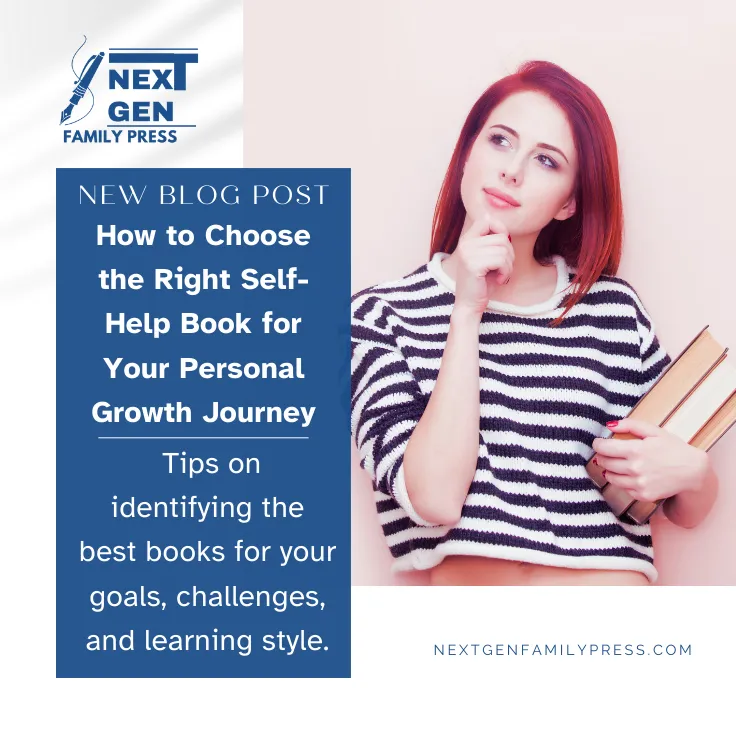
How to Choose the Right Self-Help Book for Your Personal Growth Journey
In today’s fast-paced world, personal development is more than a trend — it’s a necessity. And with shelves brimming with self-help books promising everything from instant confidence to financial freedom, choosing the right one can feel overwhelming. The truth is, not every self-help book is created equal, and the best one for you depends on where you are in your journey and what you're truly seeking.
Here’s a guide to help you choose the right self-help book that aligns with your needs, values, and goals.
1. Start with Self-Reflection
Before you even pick up a book, take a moment to assess what you’re looking to improve or understand about yourself. Are you struggling with anxiety? Want to develop better habits? Improve relationships? Get clearer on your goals. The more specific your intentions, the easier it is to find a book that speaks directly to them.
Tip: Journal your thoughts or make a list of areas you want to grow in.
2. Identify Your Preferred Learning Style
Some people love research-backed insights, while others prefer storytelling and real-life anecdotes. Think about how you absorb information best. Do you enjoy structured frameworks, actionable tips, or more philosophical perspectives?
If you prefer science and structure, look for books by psychologists or researchers.
If you’re drawn to stories and inspiration, try memoir-style books or those by motivational speakers.
3. Research the Author’s Background and Intentions
An author’s credibility and experience can make a big difference. Look for writers who have real-world expertise or have personally walked the path they’re writing about. Also, consider their tone and worldview — does it align with yours?
Tip: A quick online search or browsing the author’s interviews can offer insight into their motivations and approach.
4. Read Reviews — But Critically
Amazon, Goodreads, and YouTube are full of reviews, but remember: one reader’s favorite might not resonate with you. Focus on reviews that explain why a book helped or didn’t help, rather than just the star rating.
Watch out for: Overhyped books that promise unrealistic transformations without actionable content.
5. Sample Before You Commit
Most books offer free previews online. Read the introduction and a few chapters. Ask yourself:
Is the writing style engaging?
Do I feel understood or inspired?
Is the advice practical and relevant to my situation?
If it feels dry or disconnected, don’t force it. Move on.
6. Match the Book’s Scope to Your Readiness
Some books dive deep into emotional work or complex psychology. Others focus on daily habits or surface-level changes. Be honest about what you're ready for. Don’t jump into trauma healing if you're just starting to explore mindfulness.
Balance is key: Choose books that stretch you, but don’t overwhelm you.
7. Check for Actionable Takeaways
A good self-help book should offer more than motivation — it should give you tools. Whether it’s reflection questions, exercises, or step-by-step strategies, look for content that encourages you to take action, not just nod in agreement.
8. Stay Open but Discerning
It’s okay to explore different authors, ideologies, and approaches. Just remember, self-help isn’t one-size-fits-all. Stay curious, but also trust your gut. If something feels off or too pushy, it might not be the right fit for you.
Final Thoughts
The right self-help book won’t solve all your problems overnight, but it will offer insights, tools, and encouragement to help you grow. Choosing the one that resonates with where you are — and where you want to go — can make all the difference.
Remember: The most powerful personal growth tool is not the book itself, but your willingness to apply what you learn.
Recommended Next Steps:
Start with one goal in mind.
Make a short list of books based on your area of focus.
Choose one, commit to it, and take notes as you go.
Reflect and re-evaluate after finishing — what worked, and what didn’t?
Your growth journey is uniquely yours. Let your next read be a meaningful step forward.